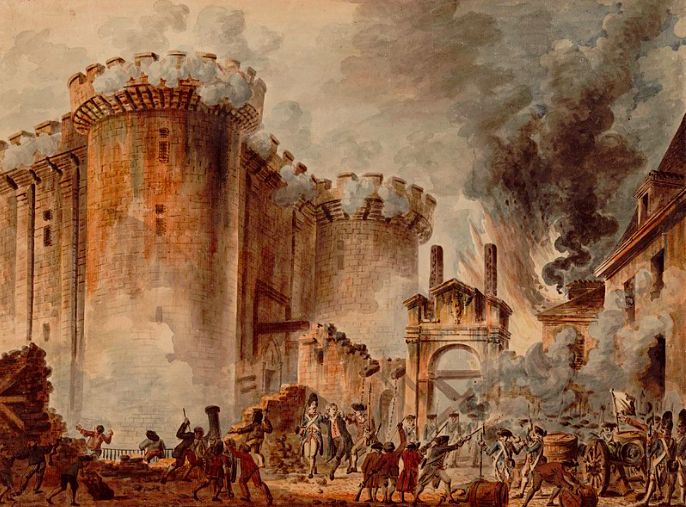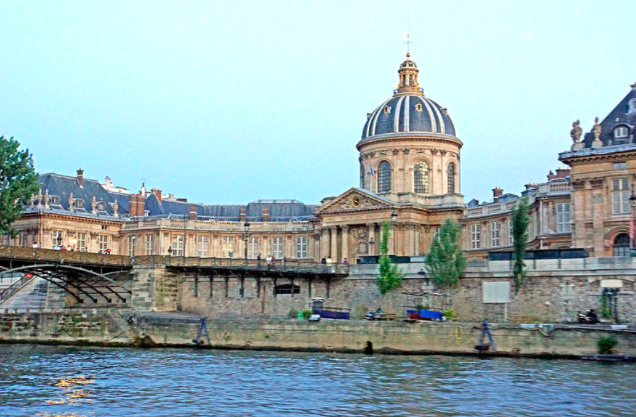French language trouble Part 4: And the winner is… do you care?
The trouble with the French language is that Air France pilots can’t speak it either. Even when they’re approaching Charles de Gaulle Airport, they’ve been ordered to speak English. And this includes when they’re talking to native French air traffic controllers.
Quel scandale !

Could the French language have brought down the Bastille?
Had the Bastille still been standing in 2021, French aircrews would have pulled it down. Here’s why: Aviation English has long been the de facto language of the International Civil Aviation Organisation. And the rationale is that it’s essential for ALL aircrews to understand ALL conversations with air traffic control, including those of both French and foreign airlines. So Air France now accepts that, in the interests of safety, it is time to shift to the international standard: everyone must speak English. And the ICOC won’t take “Non!” for an answer from the national carrier’s cockpit crews.

The cross-fertilisation of the French language
The Académie française is both revered and ridiculed in equal measure. Although languages tend to borrow from each other all the time, French has never been keen on any of that cross-fertilisation stuff. But as technology advances and cultural shifts occur, fresh words and expressions are continually being spawned to cover the latest concepts. Every day there are new words queueing up to potentially corrupt and pollute the French language. This avalanche of English colloquial expressions continues to play havoc with l’Académie’s language purists.
Expressions like ‘bad hair day’, ‘carjacking’, ‘road rage’, and ‘soccer mom’ are almost impossible to translate into other languages. For many, the English phrase is hard to resist and foreigners end up simply adopting the trendy word or phrase as one of their own.
The French Academy, however, tends to stress and obsess about finding a distinctive word for these trespasser words. But reinventing the wheel is not that easy, and many English expressions have found a safe harbour in French, much to the chagrin of l’Académie française.

Penetration of the French language
The Académie functions as language police to protect the purity of French. It’s their job to form a barrier against anything that could contaminate the language. A linguistic Maginot Line against invasion. But, like the famous World War I fortification built to counteract a German invasion, it’s been proved vulnerable, and easy to penetrate. Especially by fashionable English words and expressions.
The Academy operates with forty ‘Immortels’, or members, who are all eminent writers, thinkers, historians, and philosophers. (Only four have ever been women, and the current average age is 78). So when any foreign words and phrases gather at the gates, they do their best to conceive of acceptable French alternatives.
Cool or quelle bonne nouvelle ? Hardly cool
Like ‘Mot-dièse’ instead of ‘Hashtag’. And ‘Un trafiquant de drogue’, for ‘dealer’. Even where a trendy word like ‘cool’ is used universally by both English and French speakers, l’Académie says it’s a no-no. They prefer, ‘quelle bonne nouvelle’ or ‘a l’air sympathique’. Hardly cool expressions, either of them. And they don’t quite roll off the tongue either.
English language not afraid of appropriation
On the other hand, an important English trait is that the language appears to have lost the fear of being ‘contaminated’ by foreign languages—or of being subsumed by new vocabulary. Catchy words from other languages are (and always have been) appropriated without hesitation: Kindergarten (German), macho (Spanish), tsunami (Japanese), typhoon (Chinese), assegai (Zulu), bungalow (Bengali), dingo (Dharug), wigwam (Ojibwe) bagel (Yiddish), sabbatical (Hebrew), sheikh (Arabic), and cosmonaut (Russian). A vast lexicon of foreign terms has simply become English words.
An international tongue—a world language, but which one?
L’Académie française may rue the influence of English, but as a global language, the case for an alternative international tongue is tenuous. Linguists now believe that there is a critical mass of English speakers throughout the world that will sustain its growth and prevent its demise. This puts English into a unique and irreversible category. And it continues to consolidate. America’s worldwide influence and cultural dominance have further entrenched it as the de facto lingua franca in the world of business, publishing, computing, IT, and the Internet. And it’s also dominant in international academia, science, education, politics, and the entertainment world of music, film, and television.
Although Mandarin Chinese is often raised as a serious contender for a future world language, it’s one of the most difficult languages to master, and it’s not very computer-friendly at all. Even in China, over 400m people do not speak it.
Globalisation, computerised translation technology, the spread of hybrid languages, and many other matters, all pose real challenges to the dominance of English. But they apply equally to French, and therefore somewhat cancel each other out. And the smart money still seems to be riding on English as the language the world will speak in the future.
How important: fluency in French?
However, although even if fluency in French is no longer the sharp-tipped arrow in the quiver of career opportunities, it still retains a high level of cachet. And it has the soft power of being very chic for a foreigner to speak. Perhaps that’s why we continue to learn French in our millions. Simply because we love it.
…And, anyway… it’s still the language of love.
“Bonne chance et bon courage avec la langue de l’amour.”
What are your views on the race for a ‘world language’? and how important is fluency in French? Please share your comments below.
Image credits
- Air France pilots ordered to speak French—even when approaching Charles de Gaulle airport via rustourismnews
- Had the Bastille been standing, they’d have pulled it down – via Wikipedia
- The Académie functions as a linguistic Maginot Line via Wikipedia
- L’Institut de France in Paris — seat of the Academie via wikipedia
The trouble with French Series:
Part 1: The race is on
Part 2: Who’s winning?
Part 3: The home straight
Part 4: And the winner is… do you care? (this one)






